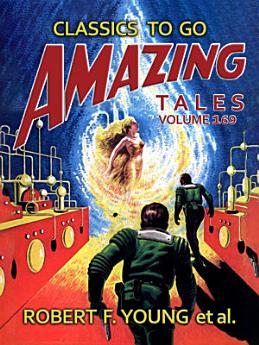Amazing Tales Volume 169
Feb 2024 · CLASSICS TO GO Book 169 · Otbebookpublishing
Ebook
100
Pages
family_home
Eligible
info
reportRatings and reviews aren’t verified Learn More
About this ebook
"Amazing Tales Volume 169" invites readers into a world of diverse narratives that explore themes of devotion, survival, and futuristic conflict. In Robert F. Young's "I Bring Fresh Flowers", journey into the poignant life of Rosemary Brooks, a young woman whose unyielding devotion to God and country sets her apart in a world that prizes conformity. This touching story explores the complexities of faith and individuality in a society that demands sameness. Transitioning into a world on the edge, Jack Sharkey's "The Smart Ones" presents a tense narrative where Pete and Beth find their mundane lives interrupted by a grave news bulletin. As global tensions rise, they and their friends must prepare for an uncertain future, contemplating their place in a world teetering on the brink. Next, Harry Harrison's "Down to Earth" takes us on a thrilling lunar adventure. Astronaut Gino Lombardi faces a life-or-death situation when his crewmate becomes trapped on the moon. In this gripping tale of survival, Harrison masterfully blends suspense with the spirit of exploration, as Lombardi races against time and the harsh lunar environment. In "War in Heaven", Fletcher Pratt offers a refreshing take on space warfare. Known for his military insight, Pratt replaces fantastical space battles with a more grounded narrative, using solid-shot and space-mines instead of death-rays. This story provides a provocative glimpse into what future cosmic conflicts could entail. Finally, Gene L. Henderson's "The Small Bears" transports us to a mysterious planet veiled in clouds. Here, a crew of space explorers discovers a graveyard of vanished ships and encounters aliens as deceptively adorable as Koalas. This intriguing tale weaves themes of exploration and the unknown with a touch of whimsy. Each story in "Amazing Tales Volume 169" offers a unique perspective, drawing readers into captivating worlds that challenge and inspire.
About the author
Robert F. Young, an American science fiction and fantasy writer, remains a captivating figure in the literary world, known for his lyrical prose and imaginative storytelling. Born on June 8, 1915, in Silver Creek, New York, Young's literary career blossomed in the mid-20th century, a period marked by rapid technological advancements and the burgeoning space race. His works often reflect a deep fascination with the cosmos and human potential, blending poetic sensibilities with speculative fiction.Young's stories frequently appeared in prominent science fiction magazines such as "Astounding Science Fiction" and "The Magazine of Fantasy & Science Fiction." His narrative style is distinguished by its emotional depth and philosophical inquiries, often exploring themes of love, loss, and the human condition against the backdrop of futuristic settings. This unique blend of introspection and innovation has earned him a dedicated following and critical acclaim.Despite his relatively low profile compared to contemporaries like Isaac Asimov and Arthur C. Clarke, Young's influence on the genre is undeniable. His ability to infuse science fiction with profound emotional resonance paved the way for later writers who sought to explore the genre's more humanistic aspects. Authors such as Ursula K. Le Guin and Ray Bradbury have echoed his approach, emphasizing character-driven stories within speculative frameworks.Young's legacy is also marked by his resistance to the commercialization of science fiction. He remained committed to crafting thoughtful, original narratives, often eschewing the more sensationalist trends of his time. This dedication to artistic integrity, coupled with his evocative storytelling, ensures that Robert F. Young's contributions to science fiction continue to inspire and resonate with modern readers.
Rate this ebook
Tell us what you think.
Reading information
Smartphones and tablets
Install the Google Play Books app for Android and iPad/iPhone. It syncs automatically with your account and allows you to read online or offline wherever you are.
Laptops and computers
You can listen to audiobooks purchased on Google Play using your computer's web browser.
eReaders and other devices
To read on e-ink devices like Kobo eReaders, you'll need to download a file and transfer it to your device. Follow the detailed Help Center instructions to transfer the files to supported eReaders.











